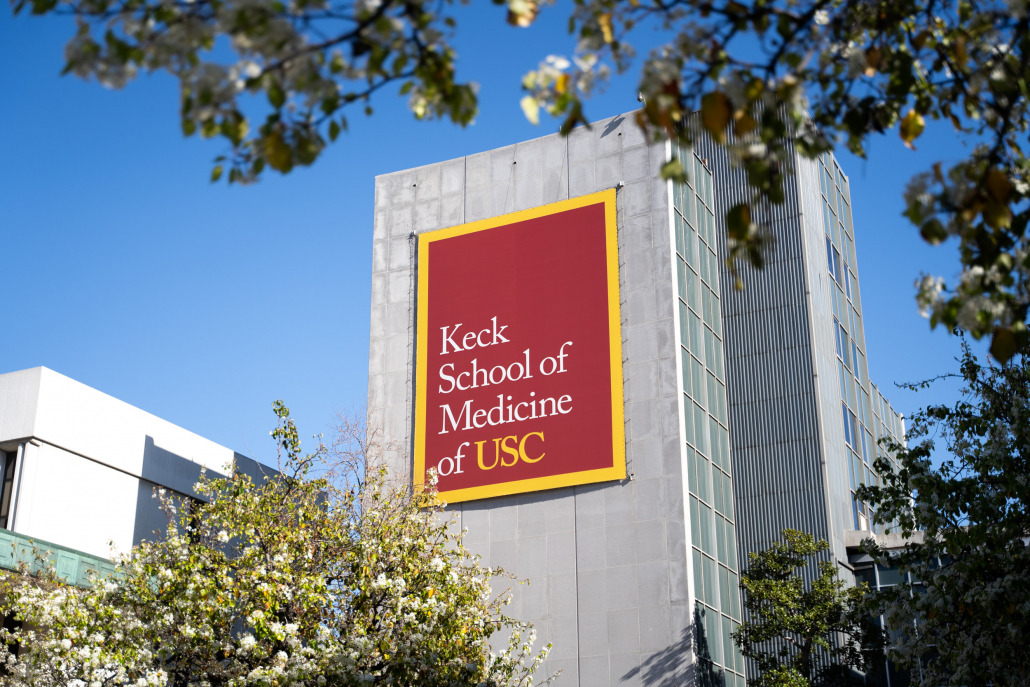Cases, test positivity rates decline at USC

The USC community is not experiencing the coronavirus surge that many health officials warned of at the start of the fall semester, USC Chief Health Officer Dr. Sarah Van Orman said Thursday at a student health briefing.
Of the record 37,243 tests administered last week, 130 students and 13 employees tested positive for the coronavirus. Cases declined this week among students and increased among employees, according to data uploaded by the USC COVID-19 Dashboard.
The positivity rate among students this week was 0.36% — a drop from the previous positivity of 0.47% reported last week. For employees, however, the positivity rate grew slightly to 0.9% from 0.7%.
Van Orman said the University is headed in the right direction in the fight against the pandemic.
“This week we are running at 0.3% [positivity], which is very good news, and this [two to three week period into the semester] was the period that we were concerned about in terms of vulnerability,” Van Orman said.
Van Orman emphasized that the improving trends on campus are due to the mitigation efforts aggressively implemented by the University — coupled with declining coronavirus prevalence within the greater Los Angeles community.
“The aggressive mitigation efforts [like] masking, testing, restrictions, Trojan Check were all designed to keep us from having a surge,” Van Orman said. “The other thing that is interesting is the relationship [between coronavirus case counts on campus] to the community rates.”
According to metrics posted on L.A. County’s Public Health website, the average seven-day test positivity rate is 1.87%. While that rate is higher than the one seen on campus, it is considerably lower than the 6% rate that peaked at the beginning of August.
“Cases in L.A. have actually plateaued and may be starting to turn around,” Van Orman said. “It’s good, it’s very good news, so I think that’s kind of exactly what we wanted to see.”
Despite the improving trends seen within USC’s campus community, Van Orman said the University is still experiencing higher positivity rates compared to those seen in April and May. Moreover, Van Orman does not believe that now is the time to scale back preventive measures.
“We want to reduce the mitigation efforts, and that’s important, but we also want to do it at the right time,” Van Orman said. “We will have another week or two of data to determine in particular whether we need to keep up with the current mitigation efforts.”
Van Orman commended the student body for its cooperation and vigilance in combating the delta-induced coronavirus surge that is still ravaging some parts of the country.
“We’ve seen very strong responses from students in terms of their behavior, strong compliance with testing, strong compliance with mask-wearing, so students have been very good with behavior,” Van Orman said.
In response to concerns that a new wave of infections could stem from the season-opening football game last Saturday, Van Orman said “we could be OK.”
“We had a lot of people gathering and potentially spreading, but if there weren’t a lot of cases, we might not see a lot of spread,” Van Orman said. “It kind of depends on what the prevalence was at the game, and if we really were on a down curve, we could be fine with the game.”
As of Thursday, Van Orman said she is not aware of any students that have been formally disciplined for fraudulently presenting their daily Trojan Check wellness assessment. In an effort to enhance enforcement efforts, Van Orman said the Care Crew will be scanning all QR codes, instead of waving people through the gates of campus.
Van Orman implored the student body to return to the fundamental question of why the University is enforcing the health protocol, which is designed to keep students and faculty safe.
“From my perspective, I’d like to think that we don’t have to enforce this with any student — that if you’re a Trojan and you’re a part of our community — you understand why we’re doing this,” Van Orman said. “It’s really not about ways to subvert the system, it’s finding ways to understand why those systems are in place.”
Additionally, Van Orman said students who suffer from chronic illnesses that are unrelated to the coronavirus should be evaluated by a medical professional and submit clearance to Student Health to remain in compliance with Trojan Check.
While health officials are relieved with indications that the current coronavirus surge is retreating, concerns continue to grow with new and more problematic variants emerging from around the world.
On Sept. 2, the World Health Organization added the mu strain to the list of “variants of interests” due to preliminary evidence that it could evade vaccine protection. The new variant has been detected in 49 states, including California.
Van Orman highlighted that the delta variant remains the most dominant strain among USC positive samples, but acknowledges that the emergence of new strains is a genuine source of concern.
“We do believe that we’re on the other side of this delta peak, and so the question of other variants will become very important over the next couple of weeks — including the mu [variant,”] Van Orman said.
Meanwhile, Van Orman cited high vaccination rates, particularly increasing rates among international students, in why she is optimistic about coronavirus cases on campus in the weeks ahead.
“We want to keep heading in this direction because if we keep heading in that direction, that means the ability to relax all these [restrictions], but a lot of why we’re in where we are now is because of everything we had in place, so it’s good news,” Van Orman said.

